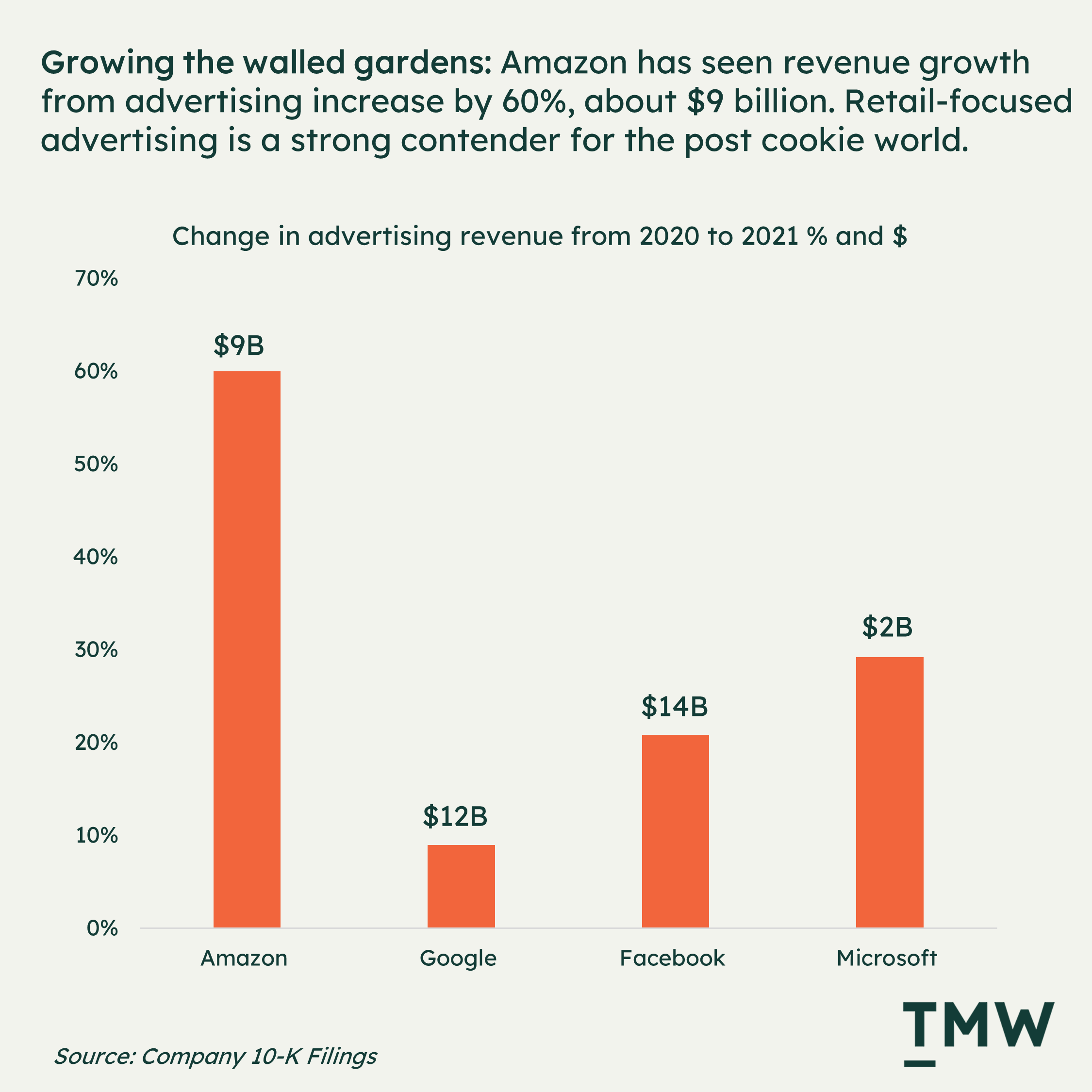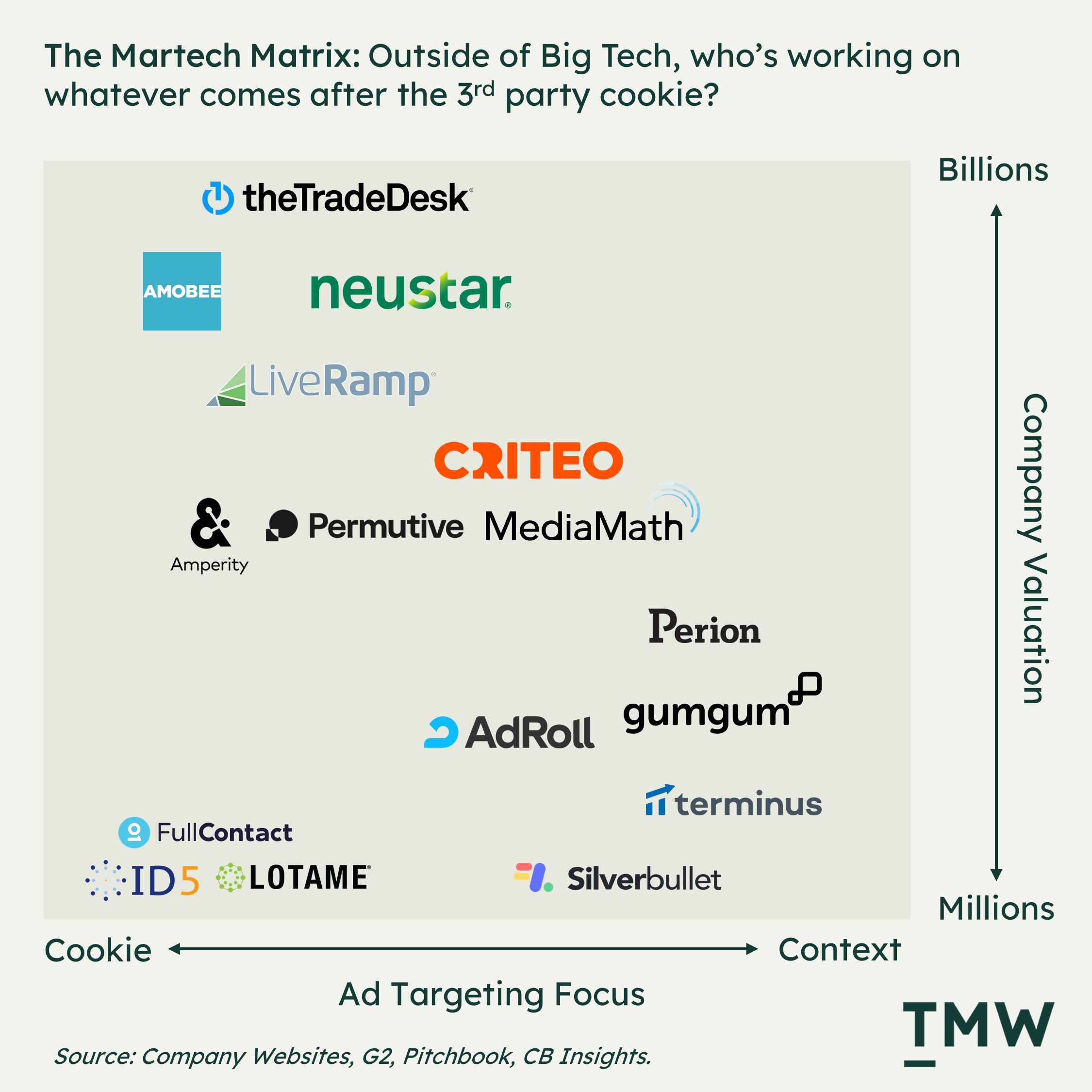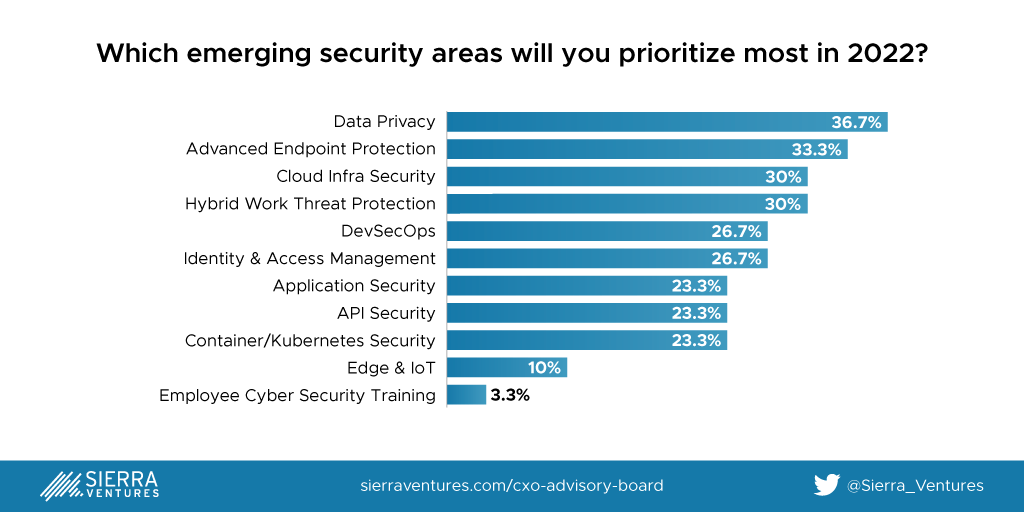TMW #071 | The cookie situation, how CTOs are investing and regulating crypto.
Welcome to The Martech Weekly, where every week I review some of the most interesting ideas, research, and latest news. I look to where the industry is going and what you should be paying attention to.
👋 Get TMW every Sunday
TMW is the fastest and easiest way to stay ahead of the Martech industry. Sign up to get the full version delivered every Sunday for this and every TMW, along with an invite to the TMW community. Learn more here.
🎤 TMW’s first podcast of the year is live - What it takes to lead a Martech team.
Here’s the week in Martech:
● The cookie situation: Renaissance or revolution?
● The privacy imperative: How are CTOs investing?
● Crypto regulation: It's finally happening.
● Everything else: Snap’s AR strategy, content moderation, the history of Salesforce, vendor bullying, Martech innovation in 2021, podcast advertising, anti-social social, and why no one smiles in luxury stores.
✍ Commentary
The cookie situation: Renaissance or revolution? This week I’ve devoted a chunk of time to understanding how AdTech is changing in our so-called post-cookie world. This effort has felt more like trying to solve a riddle, which is wrapped in an enigma and hidden in a maze at the bottom of the ocean.
The reason for my deep dive into AdTech is that Google this week is once again changing how the company sees the future of targeted advertising by announcing the decommissioning of FloC (Federated Learning of Cohorts) and a pivot to something called Topics. What kinds of consequences does this create in our advertising environment? I wanted to find out.
The problem with Adtech right now is there’s no unified view of what is happening today and what will happen in the future with data collection and targeting practices. After researching the space, I have two ways of thinking about the future of the industry; are we working through a renaissance or a revolution? Is the situation we’re in a rediscovering of something in the past that sets a new paradigm for the future or a complete changing of the guard? Leonardi DaVinci, or Napoleon?
Google’s choices hold a huge amount of influence over what everyone else will be focusing on. Given that Google’s original proposal for FloC was initially rejected by most other major platforms due to regulation and monopolistic risks, Google had little choice but to pivot to something else. Chrome takes up 70% of the global share of internet browsers, and Google Search and YouTube closely resemble critical public services in society. So whatever Google does next to pay for these services is worth noticing.
The new idea Google is trying is a concept called Topics. This is one of many experiments that make up Google’s Privacy Sandbox, the arm of the business dedicated to figuring out what happens next after the company turns off 3rd party browser cookies. The idea is that the browser on your device will collect and group you into topical groups predefined by Google. Advertisers can then use these topics-based groups to target you with ads.
It’s a very clear step toward broad-based interested profiling that other publishers are calling “contextual” but you’re still being tracked and profiled. Sure, Google’s offering a way for people to manage the way they are being grouped or switch it off completely, but the consumer use case makes little to no sense. Do people really care about the ads they see? So much so that they’d want to be updating how Google is profiling them? I would suggest that most users simply don’t care.
The other challenge is the accuracy of profiling users in this way. People have diverse needs when browsing the web, and the rigidity of a topics system may not be able to give the nuance advertisers want with assurance that people are genuinely interested in what they are trying to sell. Do yourself a favor – pull up your search history from the last week. How much of that represents intent to buy something? How much of that is randomness? Google’s profiling system, like FloC will need to be transparent in the logic of topical groupings, and given the amount of noise in someone’s daily browsing history, this won’t be easy.
Google’s experimentation in this domain is significant because it gives us a glimpse into the next tracking and targeting technologies that will inform the history of the web. The internet now services most of the world’s population every day because programmatic advertising made it free, easy to use, and most importantly - addictive. Google’s search product funneled a complex web of individual websites into a single search bar. Friendster and Myspace, and then Facebook, Instagram Twitter, and YouTube, and now Tiktok made it extremely easy to create content, build audiences and socialize online.
Online advertising was the bedrock from which the internet became so central to society and a vital lifeline for billions of people. The 3rd party cookie was an open-source technology that nobody directly controlled, it’s just a bit of code that a developer could use to send data to various platforms. The open-source nature of the technology-enabled everyone to build on top of it, and aligned incentives with publishers and platforms to build the biggest audiences possible. This, consequently, kept information free for the end-user - you and me.
But advertising also created the information environment we’re living in today, which to most of us feels increasingly fractured, divisive and misleading.
Advertising technology is now facing increasing pressure. Outside of the platform companies abandoning 3rd party cookies and, in some cases, online tracking altogether, most world governments are implementing regulations to limit data collection, while in the US, Democrats have formed a bill to make targeting advertising illegal. This is both a positive step-change in thinking about the harms the incentives online advertising creates, but also is a frightening prospect when you start asking the question – who’s going to pay for all of this stuff?
I highly doubt that the internet will retreat to the kinds of advertising of its predecessors, such as TV, billboards, and newspapers – effectively spray and pray. But the tenuous moment of today comes down to which side of the argument is driving the most net positives. Access to services or online safety? If you ask the everyday person, they’ll tell you that tracking is not what they want.
It's on this backdrop of the advertising-powered web, that I ask - is the changing state of AdTech more of a revolution, or a renaissance? You could suggest that the increasingly negative sentiment around online tracking is a call back to the earlier versions of the web without monopoly control, a renaissance if you will. That’s the story of Web3 – The internet should look like Web1 but with better UX, and on the blockchain. And back in the days of the early web many publishers created direct relationships with advertisers and offered broad-based categorizations of ad products.
But managing this is hard and time-consuming for marketers, which gave rise to programmatic platforms, a single interface to millions of publishers. This is effectively what Facebook and Google created - a single ad-buying platform to reach billions of users. It’s hard to see that there’s any clear rediscovery of something old to catalyze new ways of thinking about advertising. It’s more about responding to consumers wanting to have and eat the cake - a free internet without ads. In our day and age, it’s an oxymoron.
What about a revolution? More marketers are withholding advertising from platforms like Facebook in response to the consequences of building a massive information ecosystem where anyone can publish something. Marketers are also skeptical of where their ad dollars are being spent in an incredibly complex network of data brokers, suppliers, and ad servers, that they would rather retreat to first-party data-rich services or deal with ad networks directly.
In every revolution, there’s a clear leader that challenges existing power structures, but in today’s world of AdTech, all of the changes are being driven by the existing power structures. It’s Google’s decision to deprecate third-party cookies, it was Apple’s decision to shut down cookie tracking on Safari back in 2017 and to introduce App Tracking Transparency. For the foreseeable future, it will the existing power players in the AdTech ecosystem that will be making decisions for everyone else.
So how do we make sense of what is to come in the world of advertising technology? If the third-party cookie was open source and we can’t use this technology anymore then what is happening is the simultaneous closing and opening of the advertising ecosystem.
The first reaction is the increasing trend of more platforms creating walled gardens. Amazon, Google, Facebook, and Microsoft are all closed environments where you can advertise there but have to deal directly with each platform.
Retail media is also following this trend. Big e-commerce retail businesses like Walmart and Tesco have been experimenting with their own ad networks. All of this is just how we did ad buying in the earlier days, but bigger, better, and with more sophisticated targeting. But dealing with privacy, tracking criteria, and audience segmentation for each of these platforms is not ideal for marketers, ad agencies, or buyers.
Cookies sprayed your information all over the internet, which is obviously bad. But trusting that a few attention monoliths will keep your data safe is not the most viable option either. Despite this, the world’s largest ad networks are only growing, and the deprecation of cookies is creating opportunities for companies like Amazon to seize the day.

The second reaction is to build new “open source” ways of tracking and targeting. In the past 18 months, there’s been a flurry of new solutions and advertising identity providers. All of these solutions are effectively early-stage businesses or insourced tech from platforms like Trade Desk or collaborative experiments between the big platforms and independent advertising technology firms.
Almost all these solutions rely on first-party data to be anonymously sent and matched to existing audiences, which makes things like collecting email addresses mission-critical for advertisers. From 3rd party to 1st, it’s the same underlying concepts - collapse the interface for advertising into one or two systems, target across a variety of publishers, and run attribution back through the system. The difference is that all of this is accomplished with a riskier, more personal form of data. A cookie could be anyone, but an email address? Well. That’s a different story.
The third reaction is about ditching the concept of cookie-based targeting altogether. Publishers will collect data, segment users into categories, and then offer those audiences on their platforms. Contextual advertising is the key domain for this kind of shift. It’s like having 1,000 little islands with their own audience rules, but as long as you can sell eyeballs, then there is only upside.

On the whole, it’s too early to figure out what will replace the third-party cookie. It’s far more likely that advertising online will become increasingly diversified and require more blood, sweat, and tears from the strategy department to make it work. It’s relatively easy to say to a machine “send ads to everyone interested in sneakers aged 18 – 30 and has not purchased with us before.” It’s much harder to build a strategy to select a handful of core publishers your customers are on already, blend in major platforms using their rule sets and ensure creative will perform across all the different systems. In a lot of ways, this might catalyze marketers to more deeply understand channel and audience again, instead of letting the machine decide for them.
If I had to pick one, I would say that what we’re seeing in the Adtech world today is more of a consumer and regulatory revolution. The web wants to be more private, Google is trying to figure out what’s going to pay for it and everyone else is pulling away into different directions as contextual, 1st party targeting or a new cookie solution takes off. It looks like the kind of chaotic scenes you’d see in a revolution anyway, and that’s why Adtech is so difficult to understand right now. Links: Google replaces FloC with Topics. How we got here. ($) The “old” internet is coming back. Privacy and brand trust. 2022: The shift to first party data. Is the death of the 3rd party cookie a good thing? GDPR fines. Mi-3 post-cookies report. Advertising technology at a crossroads. The history of the 3rd party cookie.
📈Chart Of The Week
The privacy imperative. Sierra Ventures is looking at how CIO/CTOs are prioritizing their budgets and efforts in 2022. No surprises here, but the focus appears to be in the data privacy realm as increasing scrutiny and regulation mounts from all sides. Link

📰 Latest Developments
Crypto regulation? The White House has announced an investigation into crypto regulation as a matter of national security. With the amount of attention the technology has garnered over the past twelve months, it’s no surprise that regulation discussions have been accelerating. There’s a strong case here for consumer protections in the sector. Link
Snap launches AR shopping. The interesting thing about this is that Snapchat is one of the only social apps to hold onto a younger audience but is also seeing the need to augment the ways in which people shop on the platform. Using AR to assist in purchasing decisions may become a significant generational shift in eCommerce. Link
The content moderation problem isn’t going away. Two years ago, Facebook was the locale for any discussion about content moderation on online platforms. This has now shifted to other mediums. Shopify had to make a call this week to let go of Neil Young to preserve their contract with Joe Rogan due to outcries over public health misinformation. Substack, similarly came out this week with a lengthy blog post defending the rights of bad actors to continue to publish misinformation on their platform. The question of the role of technology in preventing societal harm is still wide open. Spotify. Substack.
📚 Reading
The history of Salesforce. How did one of the most influential and industry-defining companies get its start? Link
Vendor bullying. An interesting perspective from Real Story Group on the ruthless tactics vendors use to close software deals in enterprise environments. Link
The digital revolution is old news. An interesting perspective argues that most of what we call digital transformation already happened ten years ago. Link
🔢 Data & Insights
Martech innovation in 2021. According to CabinetM, 2021 brought to the industry 225 new Martech products, 196 acquisitions, and almost $40 billion in company funding. Link
Is the metaverse worth $8 trillion? Goldman Sachs analysts are predicting that the total value of the emerging category is set to reach this astronomical figure. What’s interesting about this is that other big banks are putting the metaverse in a similar ballpark of value. Link
Podcast advertising. Total spending on ads in the channel is up 20% to just over half a billion dollars last year. It’s taken more than a decade, but the market for advertising in podcasting is finally having its day. Some of this is reflective of marketers diversifying their ad spend as a hedge against changes in the more mainstream channels. Link
💡 Ideas
Combinatorial innovation. Ecosystems play an interesting role in facilitating collaboration between different apps to meet marketing needs. But how does it work in practice? Link
Anti-social, social. One drawback with social networks is that they play a role in incentivizing anti-social behavior. Brands are seeing that amping up the unhinged, weird, and unusual content gives them cut through. Link
Line goes up. This was making the rounds on social this week. It’s a two-hour video essay from Dan Olsen laying out a well-researched case for why Web3 won’t be a good thing. Link
✨ Weird and Wonderful
Why no one smiles in luxury stores. Apparently, it boosts sales. Link
The quantifiable story. A fascinating analysis looking at the correlation between the shape of various types of stories and their popularity. Link
Blockedchain. Link
Stay Curious,
Make sense of marketing technology.
Sign up now to get TMW delivered to your inbox every Sunday evening plus an invite to the slack community.
Want to share something interesting or be featured in The Martech Weekly? Drop me a line at juan@themartechweekly.com.
